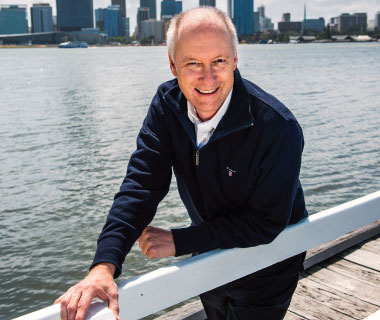Managing Director’s welcome
Our commitment to sustainability continues to underpin all our efforts and while I’m proud of the progress we have made in our environmental, social and economic performance, the expectations we and others have for continuous improvement mean we still have plenty of work to do.

Richard Goyder
Managing Director
Our commitment
Wesfarmers has long recognised the value of a holistic approach to managing our businesses. We started reporting on sustainability-related matters back in 1998 when we stated that we were ‘committed to continuous improvement in our environmental, health and safety performance’.
This commitment continues to underpin all our efforts and while I’m proud of the progress we have made in our environmental, social and economic performance, the expectations we and others have for continuous improvement mean we still have plenty of work to do.
We recognise that as a major employer and participant in business in many communities across Australia and New Zealand we have serious obligations to operate in a sustainable way.
Carbon price
One of the most contentious issues in Australia over the past year has been the introduction of carbon pricing and formal carbon emission caps through implementation of the federal government’s Clean Energy Future legislative package.
We have stayed out of the political debate, but Wesfarmers has consistently supported putting a price on carbon as a policy objective. For us, the challenge of reducing our greenhouse gas emissions has always been driven by much more than the prospect of legislative change. We have been motivated by doing what is right for the environment, for our customers and for our businesses.
We have steadily improved our preparedness for a world in which carbon is priced by continuing to invest in energy efficient technologies and systems. Greenhouse gas emissions from processes at our Chemicals, Energy and Fertilisers business have been reduced thanks to the introduction of new technology, without restricting productive output. Coles supermarkets continue to rollout in-store initiatives which improve their energy efficiency and enhance the shopper experience. These are just two examples from within our businesses of significant initiatives that lower our emissions.
With the new carbon price laws now in place, our focus is on compliance, further improving our energy efficiency, and greater reductions in direct emissions where we can do that sensibly.
Quality people
All the initiatives and programs outlined in this report are driven by our innovative, resourceful and creative team members. The sustainability and underlying success of our operations is, in every sense, in the hands of our people. Their skills constitute our only true competitive advantage and are our most important sustainable resource.
With an employee base of approximately 200,000 people, one of the biggest challenges facing our organisation, like many others in Australia and New Zealand, is attracting and retaining quality team members. Each of our business units operates its human resource function autonomously and have their own programs to invest in team members’ skills and capabilities, complemented by a number of Group programs for executives.
However, the broad Wesfarmers objective is to ensure we provide fulfilling and safe workplaces, we reward good performance and provide opportunities for advancement. This remains our most significant contribution to the communities we serve.
This year we have made some important improvements in our safety performance but we are still a long way from our goal of zero harm and we will redouble our efforts to achieve safer workplaces in the years ahead.
Through our Reconciliation Action Plan (RAP), launched in 2009, we committed to a number of initiatives aimed specifically at increasing employment opportunities for Aboriginal people within our businesses. Pleasingly, we are improving in this area, and many of our businesses have implemented specific Aboriginal employment programs ranging from cadetships to pre-employment training courses. There is, of course, more work to be done, but as our businesses continually look for ways to improve we expect better and better outcomes.
Partnerships
Another important area we continue to focus on is our community partnerships. All our businesses have extensive community contribution and support programs, many of which are outlined in this report.
We are major sponsors of the arts, health and medical research, indigenous initiatives like the Clontarf Football Academy, education programs from school to university, and a range of national charitable organisations.
Collectively, these programs make a significant difference to local communities all over the country.
Wesfarmers understands that our businesses only exist with strong customer and community support and our programs are designed to ensure we remain an integral part of the communities in which we live and work.
While the customer is at the core of all our business endeavours it is the case that the suppliers of our goods and services are also a vital part of making Wesfarmers the company that it is today. Our over-riding objective is to ensure our suppliers are treated fairly and with integrity so that their relationship with our businesses is mutually beneficial.
My thanks
I would like to thank all the employees of the Wesfarmers Group who have contributed to the positive progress we have made with our sustainable business strategies over the past 12 months.
I am very proud of our actions and achievements. Last year, our reporting efforts were recognised when we won the Sustainable Company of the Year at the 2011 Australian Sustainability Awards. This achievement aside, I trust that the readers of this report are able to find the information necessary for them to form their own view of our progress.
 Richard Goyder
Richard Goyder
Managing Director


